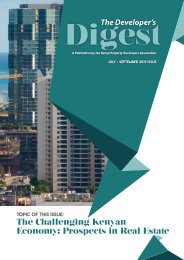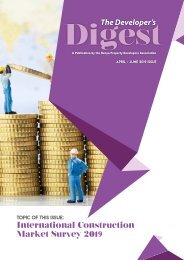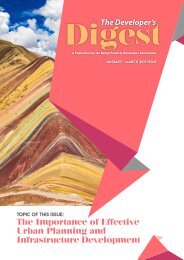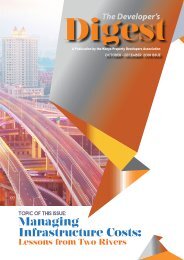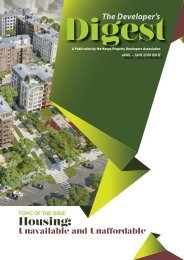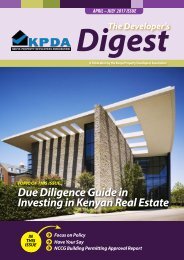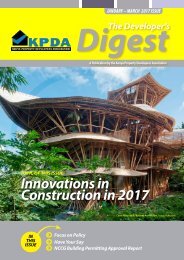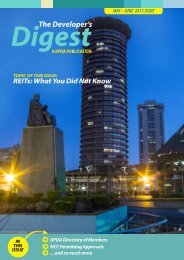The KPDA Bulletin - January to July 2020 Issue
You also want an ePaper? Increase the reach of your titles
YUMPU automatically turns print PDFs into web optimized ePapers that Google loves.
J A N U A R Y T O J U L Y 2 0 2 0
Affordable Housing Can
Become a Reality for
Cities
By the World Economic Forum
Cities are growing at an unprecedented rate, presenting an
incredible opportunity for the development of local economies.
However, their residents need good, affordable housing – and
this remains a challenge around the world. Well-functioning
property markets can act as a financial springboard for
enterprises and job creation. An enabling environment for
affordable housing can be developed with the right
infrastructure, investment and macroeconomic policies targeted
towards social and financial inclusion.
Affordability – Exploring the Problem
The challenge of affordability requires not just short-term fixes
but also long-term strategies. Solutions will need to address both
the supply side and the demand side of the housing market, and
involve public-sector, private-sector and non-profit
stakeholders.
It is not only about being able to
afford to buy or rent a house, but
also being able to afford to live in
it. This goes beyond meeting
expenses related to operations
and maintenance; it also involves
considerations of transport,
infrastructure and services. If a
house is cheap enough to buy and
run, but located far from
livelihood opportunities or
amenities such as schools, it
cannot be said to be affordable.
The reasons for a lack of
affordability vary from city to
city, but commonly include
housing costs rising faster than
incomes, supply of houses not
keeping up with demand, scarcity
of land, and demographic changes
such as population growth, ageing
and changes in household
composition.
Supply-Side Challenge 2: Land
Use
City governments generally use
two tools – zoning and regulation
– to shape where and how new
houses can be built.
Consideration
is given to:
- Transit-oriented development,
in which expansion of cities is
planned around new urban
transport infrastructure.
- Algorithmic zoning, with
incentives for developers based
on assessment
of what is needed to maximize the
vibrancy of a community.
-




